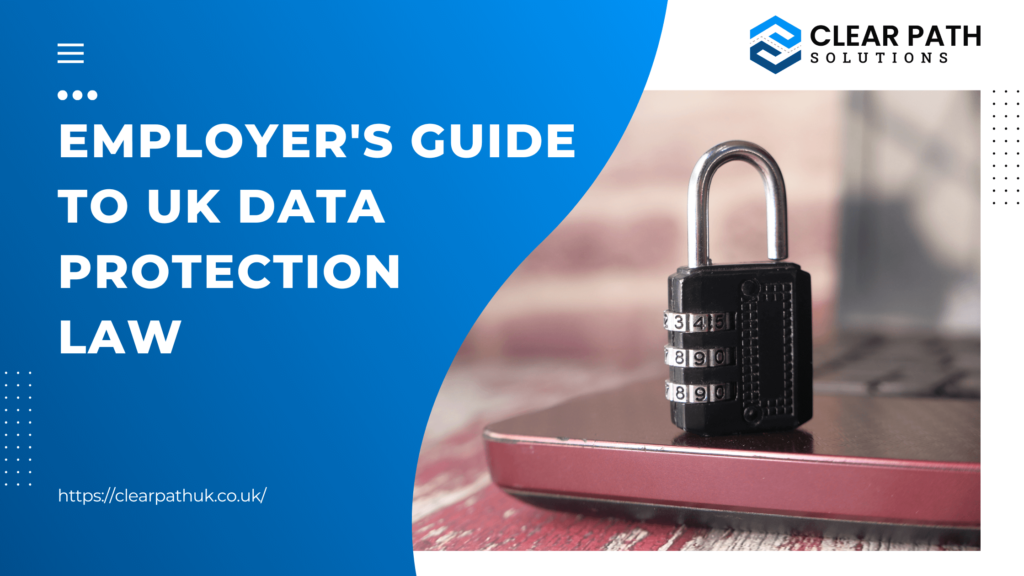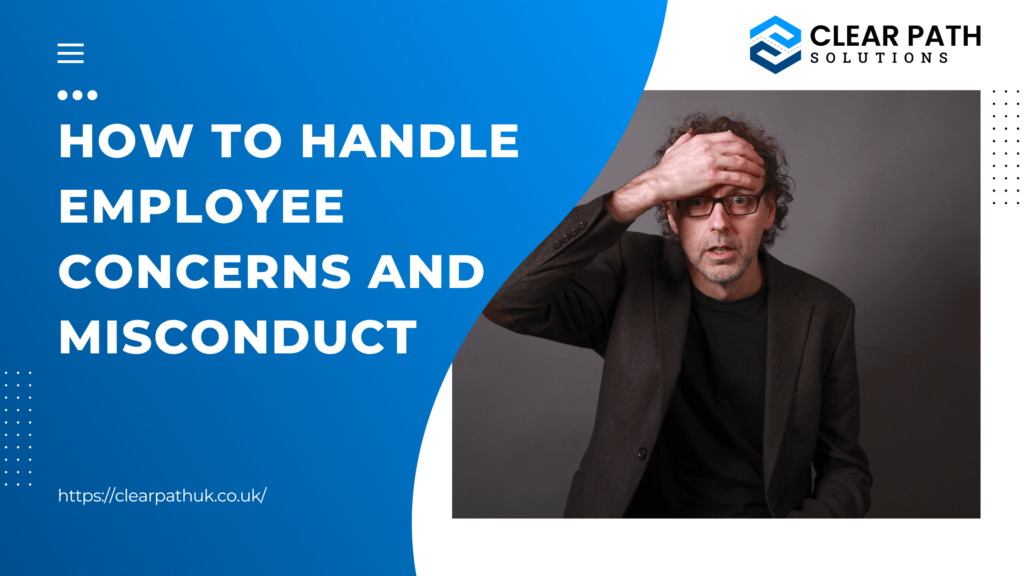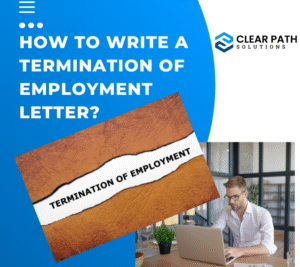Understanding Data Protection Law in the UK: A Guide for Employers (2025)

Data protection isn’t just an IT issue. It’s a legal and ethical responsibility that affects every UK employer — especially SMEs.
With digital operations becoming the norm and employee data being collected more than ever, it’s critical for employers to understand and comply with UK data protection laws. Failure to do so can result in fines, reputational damage, and a breakdown of trust.
In this practical guide, we break down what UK employers need to know in 2025 about data protection, legal responsibilities, employee rights, and how ClearPath can help you stay compliant.
Why Data Protection Matters for UK Employers
In today’s data-driven workplace, employers are expected to handle employee information with utmost care. Whether it’s storing CVs or managing absence records, even small mistakes can have big consequences. Here’s why prioritising data protection is essential for every UK business in 2025:
- Legal Compliance: The UK GDPR and Data Protection Act 2018 legally require businesses to protect personal data.
- Risk of Penalties: Fines for non-compliance can reach £17.5 million or 4% of annual global turnover.
- Employee Trust: Employees expect their personal information to be handled securely and fairly.
- Operational Reputation: Mishandling data can damage your employer brand and make it harder to attract or retain talent.
Getting data protection right from the start allows you to stay focused on running your business — not cleaning up after costly mistakes.
Key Data Protection Laws Employers Must Follow
Understanding the legal landscape is the first step toward compliance. UK employers must be familiar with the key regulations governing data use in the workplace. Let’s explore the most important ones:
1. UK General Data Protection Regulation (UK GDPR)
The UK GDPR governs how businesses collect, store, and use personal data. It applies to all employers processing data about job applicants, employees, contractors, and former staff.
2. Data Protection Act 2018 (DPA)
The DPA sits alongside the UK GDPR, adding more detail around processing employee data and exemptions for HR purposes.
3. Employment Practices Code (ICO)
This non-binding but influential guidance from the Information Commissioner’s Office (ICO) helps employers apply data protection principles fairly in workplace settings.
Staying up to date with these laws ensures you’re operating within the boundaries of employee privacy rights and safeguarding your business from unnecessary risk.
Also check our recent blog on >>
What Counts as "Personal Data"?
Before you can comply with data protection law, it’s important to know what kind of information falls under its scope. Here’s a breakdown of what is considered personal data in the workplace:
Understanding what qualifies as personal or special category data is key to applying appropriate safeguards and meeting your legal obligations.
—For employers, personal data includes:
- Names, addresses, and contact info
- National Insurance numbers
- Bank details and payroll data
- CVs, performance reviews, and disciplinary records
- Health or absence information
- Emails, photos, CCTV footage
Sensitive data (called ‘special category data’) requires stricter protections. This includes racial or ethnic origin, trade union membership, health, and sexual orientation.
Your Legal Responsibilities as an Employer
Employers have a legal duty to protect employee data at every stage of the employment lifecycle. These responsibilities ensure fairness, security, and transparency in handling personal information. Here’s what you need to do:
1. Lawful Basis for Processing
You must have a valid legal reason (e.g., contract, legal obligation, or consent) to collect and process employee data.
2. Transparency
Employees must be told clearly and in plain language:
- What data you collect
- Why it’s collected
- How it’s used and stored
- Who it may be shared with
Usually this is covered in an Employee Privacy Notice.
3. Data Security
You must ensure data is protected against unauthorised access, loss, or misuse — through encryption, secure storage, and access controls.
4. Employee Rights
Employees have the right to:
- Access their data (Subject Access Request)
- Request corrections
- Ask for deletion (in certain circumstances)
- Object to processing or direct marketing
5. Data Retention
Only keep data for as long as it is necessary. Have a clear data retention policy and dispose of outdated data securely.
6. Data Breach Reporting
You must report serious data breaches to the ICO within 72 hours and inform affected individuals if there is a high risk to their rights.
By embedding these practices into your HR processes, you can foster trust with your employees and avoid regulatory pitfalls.
Common Data Protection Mistakes SMEs Make
Even with the best intentions, small and medium-sized businesses often fall short of compliance due to limited resources or awareness. Here are some common pitfalls that could land your business in trouble:
—- Collecting more employee data than necessary
- No formal privacy policy or notice
- Failing to train managers or staff on data protection
- Insecure storage of HR files or spreadsheets
- Using old employee records beyond legal retention limits
Avoiding these mistakes can significantly reduce your risk and demonstrate your commitment to handling data responsibly.
How ClearPath Supports Employers with Data Protection
Navigating data protection laws can feel overwhelming without dedicated HR support. That’s where ClearPath comes in. We provide end-to-end assistance to ensure you stay compliant, confident, and protected:
With ClearPath as your partner, you don’t have to face data protection challenges alone — we help you implement best practices that fit your business.
—We know SMEs often lack the internal resources to manage data protection properly — but the risk of getting it wrong is real.
Here’s how ClearPath can help you protect your business:
Privacy Policy & Notice Templates
Customisable, legally compliant documents tailored to your organisation, so you can meet transparency obligations.
Data Protection Audit
We assess your current data practices and flag risks, gaps, and opportunities for improvement.
HR Software Recommendations
We help you choose secure, GDPR-compliant tools to manage employee records safely and efficiently.
Training for Managers and Admin Staff
Easy-to-understand training on:
- GDPR essentials
- Handling Subject Access Requests
- Secure document management
Breach Management Guidance
Support in the event of a breach, including investigation steps and ICO reporting requirements.
Ongoing Compliance Updates
We keep you up to date with legal changes and help you adapt policies and procedures as needed.
Benefits of Getting Data Protection Right
Making data protection a priority doesn’t just reduce risk — it creates a more professional, trustworthy workplace. Here’s what your business stands to gain by getting it right:
- Avoid fines and legal action
- Build employee trust and confidence
- Protect your business reputation
- Operate more securely and efficiently
From reducing legal liability to fostering stronger employee relationships, the benefits of data compliance extend far beyond avoiding fines.
Don’t Leave Data Protection to Chance
Whether you’re onboarding new staff, storing absence records, or handling a Subject Access Request — ClearPath helps you stay compliant and confident.
👉 Contact ClearPath today for practical, tailored HR support — including policies, training, and data audits.
📞 Call us | 📧 Email us | 🌐 Visit clearpathuk.co.uk for a free compliance check.





